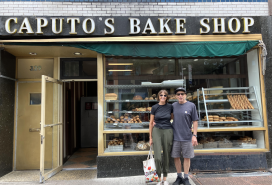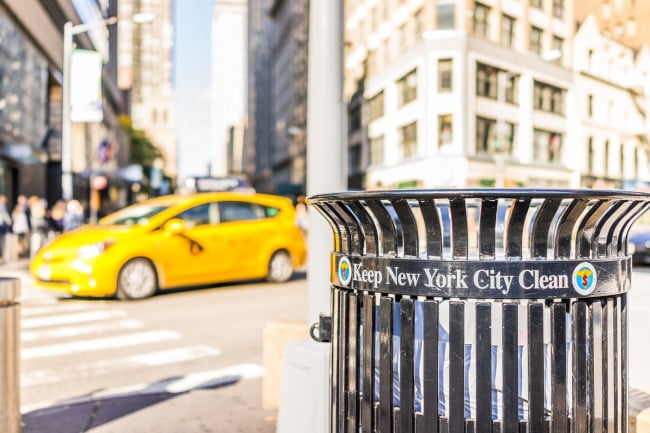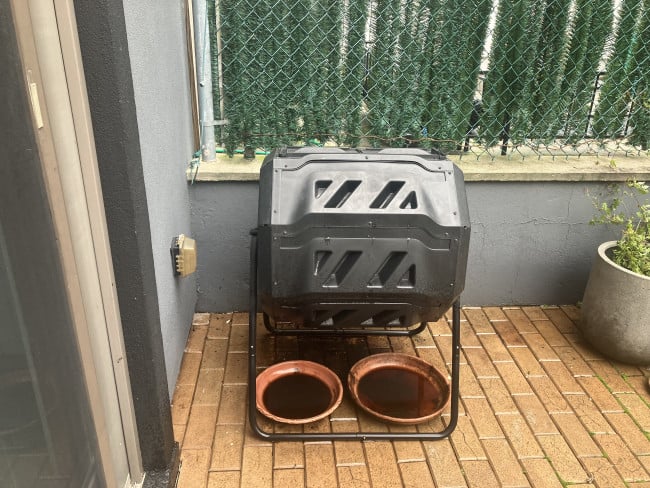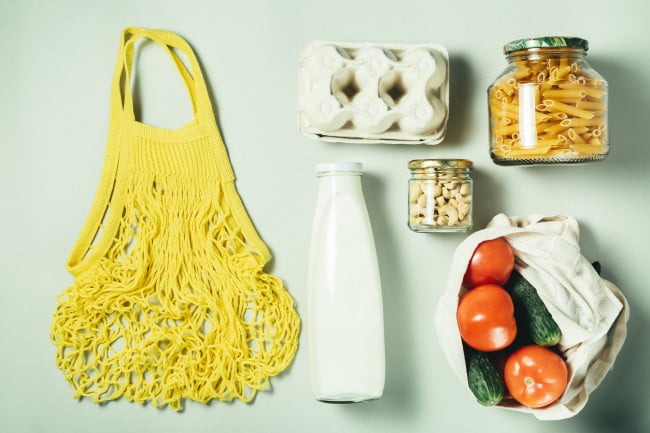All the dirt on NYC's compost collection program
- You can compost food scraps, leaves and yard waste, and food-soiled paper—even pizza boxes
- Pick up is coming to all Bronx, Manhattan, and Staten Island residents starting October 6th
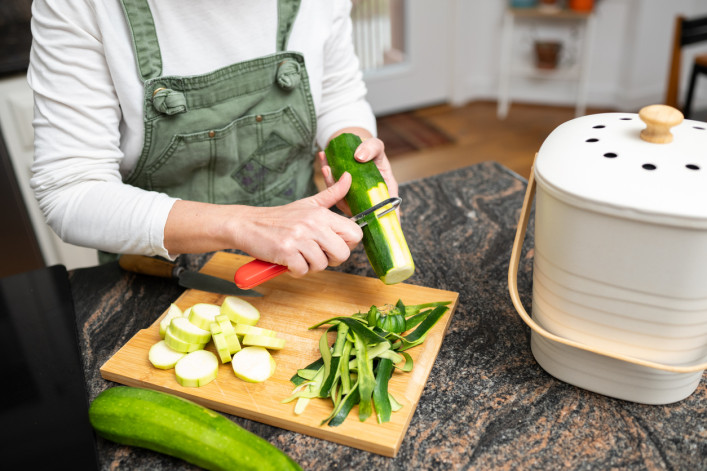
A countertop container holds food scraps while you cook and then later can be emptied into your curbside bin.
iStock
New York City's composting service is expanding to all Bronx, Manhattan, and Staten Island residents next month, and if you're new to sorting your organic waste from the rest of the trash, it may seem a little strange at first.
You may not be old enough to remember this, but there was a time when rinsing out jars and cans felt weird too, but New Yorkers adapted to the city's recycling rules. For those who are already accustomed to separating their apple cores and potato peelings from the rest of their trash, compost collection is not a big deal anymore.
“This is not only the nation’s largest curbside composting program, it is also the easiest,” said Belinda Mager, director of communications at NYC’s Department of Sanitation. “Just put anything from your kitchen or garden into a separate bin, put it out on your recycling day, and we will pick it up and turn it into compost or clean energy.”
NYC's organics collection, which accepts all kitchen and garden waste, has been available to all Queens residents and expanded to all Brooklyn residents last year. Collection will be extended to all Bronx, Manhattan, and Staten Island residents starting October 6th. The service is every week, all year round, and your organics should be set out on your recycling day.
And by the way, composting is mandatory where universal collection service is available. It is currently mandatory in Brooklyn and Queens, and it will become mandatory in the Bronx, Manhattan, and Staten Island beginning the week of Oct. 6th. Per Local Law 85 passed by the City Council in 2023, NYC will begin issuing fines in April 2025 for failure to separate compostable material. Fines for non-compliance are as follows: For one to eight residential dwelling units: $25 (for a first offense); $50 (second offense); $100 (third and subsequent offenses). For nine or more residential dwelling units: $100 (first offense); $200 (second offense); $300 (third and subsequent offenses).
[Editor's note: A previous version of this article ran in August 2021. It has been updated with new information for October 2024.]
How is this program different from previous ones?
Unlike previous iterations of the collection program, there is no signup requirement and no requirement to use a DSNY brown bin. Residents can use their own bin, as long as it has a lid and is 55 gallons or less. Brown bins are also available at nyc.gov/curbsidecomposting or bins.nyc. If you like, you can get a free decal from the city to label your DIY bin.
Why is it necessary to compost food scraps?
"When organic material is sent to landfill, it gives off greenhouse gasses as it decomposes; that’s bad for the environment," Mager said.
And, as Mayor Eric Adams said in his public announcement of the program, “By reducing the food waste that we put into trash bags, our streets will look better, smell better, and best of all, will be dealing a blow to NYC’s number one enemy: rats.”
NYC’s municipal efforts to divert organic waste through composting date as far back as 1993, when the NYC Compost Project was established by the Department of Sanitation. (The program works with city cultural organizations to educate the public on the process and benefits of keeping organic waste out of landfills.)
In 2013, the Bloomberg administration mandated the Department of Sanitation to establish a small-scale organic waste collection pilot program in neighborhoods and public schools, and by 2015, former Mayor Bill de Blasio expanded the city’s composting program to be the largest one in the country. (Its widest reach served 40 percent of the city.) And then of course, the pandemic shut the whole thing down.
What food scraps can you compost?
The city's collection program takes fruit and veggie scraps, eggshells, and even dirty paper napkins. Here’s the full list:
- coffee grounds and tea bags
- shells (seafood, nut, and egg)
- bones
- spoiled and expired food
- food soiled paper (napkins, towels, uncoated plates, bags, trays, boxes)
What can you NOT compost?
Things like fat or cooking grease are a no-go. Human and animal waste are off-limits as well.
- Trash of any kind including:
- diapers and hygienic products
- animal waste
- wrappers and packaging
- foam products
- Recyclables including:
- metal
- glass
- rigid plastic
- beverage cartons
- clean recyclable paper
- cardboard
Bonus: Fewer garbage bags
In addition to reducing food waste and greenhouse gas emissions, you will probably use fewer garbage bags and the trash you do have won’t be as wet, leaky or smelly.
"Residents who participate are often surprised that there’s not much trash left, once the paper, metal, glass, plastic, and organics are removed," Mager said.
Tips for odor-free food scrap storage
You can use any sealable plastic container to hold your scraps and keep your kitchen pest- and odor-free. For example, an empty yogurt tub, even a plastic bag—will do. Want to splurge on something nicer to leave on your countertop? Check out this roundup from Treehugger.
One of the best ways to store organics—until you're ready to put them in your brown bin—is in the fridge or the freezer. Freezing your scraps eliminates odors—and gives you a food scrap popsicle to drop into your bin—super easy!
Another suggestion if you are new to recycling organics: Start with low-hanging fruit, both literally and figuratively. Focusing on collecting organics like banana peels and leaves in your yard. It will help you start the habit.
The deluxe way to store and prep your food scraps
If you like the idea of composting but really hate the less-than-desirable realities of collecting food scraps, you may want to invest in an “accessory” or appliance to help you do so. Here are some products to consider.
The Vatya stainless steel compost bin is made in Korea, where food separation has been legally mandated since 2005. Made with stainless steel and handsome walnut handles, the bin has an interior liner and traps food odors without the use of a charcoal filter. It is available in two sizes: two liters ($69) or three liters ($79).
Lomi is a small countertop appliance that will turn your food scraps into dry, odorless “Lomi Earth,” in as few as three hours. (While not technically compost—which is the product of microorganisms breaking down organic matter—Lomi Earth can be added to your organics collection bin, a compost pile, or as an amendment to potting or garden soil. The company recently released Lomi 2 with enhanced odor control using a dual-filter system and a new cleaning mode. It is available for $599 or $399 with an additional $20 monthly subscription fee.
Mill transforms your food scraps into “food grounds,” a similar, dirt-like material. Mill measures 27 inches tall, compared to Lomi’s 12, but has more horsepower; its metal paddles can handle almost anything, including bones, avocado pits, and fruit rinds. Its sensors determine the quickest runtime to turn your food scraps into dry grounds, and you can add scraps while it is running. Charcoal filters made from upcycled coconut shells block odors. Typically $999, it is on currently on sale $849. You can also rent the appliance.
Where to drop off compost
The city has stopped collecting food scraps at most green markets and recycling centers, but there a few places where you can drop off if you prefer that method. Consult this list from GrowNYC before heading out.
The city introduced a network of roughly 400 Smart Composting Bins, operating 24 hours a day, seven days a week, and you can find them with a free app for iOS or Android phones. And while many of the traditional collection sites do not accept meat and dairy, these Smart Composting Bins do.
Want to compost it yourself?
If you've got a backyard there's no need to put your organic matter out for collection. You can buy your own composting bin and with a little effort and very little space, reap the benefit of soil made from your own compost, which comes in handy for container gardens or flower beds. The Department of Sanitation has a very thorough guide on how to use backyard composting bins.
And if you don't have a backyard, you can compost inside your apartment, but for that you need, yes, worms. Here are some instructions on how to get started in your apartment.
—Earlier versions of this article contained reporting and writing by Virginia Smith and Mimi O'Connor.
You Might Also Like




